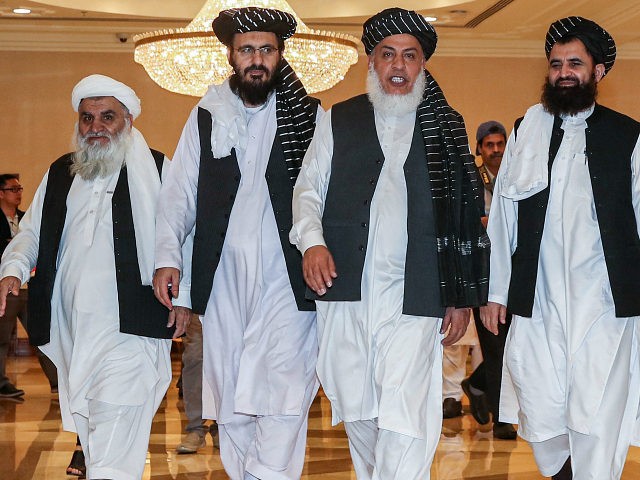The prospective peace pact between the United States and the Taliban may prompt thousands of members of the narco-jihadi group to defect to the Islamic State (ISIS/ISIL) faction in Afghanistan, the Times reported Tuesday.
An unnamed Taliban commander told the U.K. news outlet:
We have been fighting for years to the point [where] we are close to defeating the foreign troops and getting rid of the puppet Afghan government. Many commanders want to keep fighting. This deal is just face-saving for the Americans to avoid humiliation.
On August 15, Reuters quoted an anonymous Taliban fighter as saying he had no choice but to join the Islamic State branch in Afghanistan – the Khorasan Province (ISIS-K).
“During the fighting, local people got killed, many people have enemies,” the narco-jihadi told Reuters.
“To survive, I have to go to [ISIS],” he added. “Our aim is to fight the infidels and corruption, no matter under what name.”
The Taliban’s leadership has reportedly denied projections that the peace talks may push members of its group in the arms of its rival ISIS.
Since officially establishing its presence in Afghanistan in early 2015, ISIS-K has been competing for power and influence with the Taliban, many times fighting to the death.
Echoing Reuters, the Times reported on Tuesday:
The Taliban is showing signs of splitting, with thousands of fighters ready to defect to a resurgent Islamic State over peace talks that are being held with the United States.
…
While the insurgents appear confident — suggesting that President Trump’s eagerness to be rid of having to deal with Afghanistan means that an end to the foreign “occupation” is in sight — away from the talks the Taliban are in danger of splintering.
Rifts have opened between the leadership and hardline military commanders who are furious at the decision to sit down with American officials. A suspected assassination attempt targeting Mawlawi Haibatullah Akhundzada, the group’s supreme leader, was claimed by a Taliban splinter group two weeks ago.
The Times report cited members of the Taliban, ISIS, as well as Afghan officials and Western diplomats as its sources.
A spokesman for Afghan President Ashraf Ghani recently acknowledged concerns from Kabul about Taliban’s jihadis joining the already growing ISIS-K.
Sediq Sediqqi told Reuters:
Most [ISIS jihadis in Afghanistan] are ex-Taliban, and there could be a possibility of some Taliban joining. The Afghan government and the U.S. have shared goals combating terrorism. We need the support of our international partners.
A peace agreement provides “a big opportunity for [ISIS] to recruit fighters from the Taliban, and, no doubt, many Taliban fighters will happily join,” Sohrab Qaderi, a member of the provincial council in Nangarhar, told Reuters.
Nangarhar, located along the Pakistan border, houses the primary ISIS-K stronghold.
In July, the Pentagon conceded in its semiannual Afghanistan war report to Congress:
Even if a successful political settlement with the Taliban emerges from ongoing talks, AQ [al-Qaeda], ISIS-K, and some unknown number of Taliban hardliners will constitute a substantial threat to the Afghan government and its citizens, as well as to the United States and its Coalition partners.
This enduring terrorist threat will require the United States, the international community, and the [Afghan security forces] to maintain a robust [counterterrorism] capability for the foreseeable future.
The U.S. is planning to leave behind a residual force in Afghanistan to ensure the Taliban abides by its commitments under the prospective peace agreement.
Taliban jihadis have repeatedly rejected U.S. plans to maintain a limited military force in Afghanistan.
The group argues that it will only agree to a pact that involves the full withdrawal of United States-led international troops.
After more than a year of talks, Taliban and American negotiators are expected to finalize an agreement to end the nearly 18-year-old war in the coming days.
Negotiators are reportedly working on hashing out the details surrounding the timeline for the withdrawal of most foreign forces.
The primary component of the agreement includes the withdrawal of foreign troops in exchange for the Taliban’s assurances that Afghanistan will not harbor international terrorist groups like ISIS-K and al-Qaeda.
Taliban and al-Qaeda, however, remain tight, according to the Pentagon, the United Nations, and independent assessments.
Despite U.S. and Afghan pressure, including an unprecedented air campaign approved by President Trump, ISIS-K remains resilient, a U.S. watchdog agency reported on August 16.
ISIS “made territorial gains” in Afghanistan amid the ongoing peace discussions, the Pentagon said in its recent report to Congress.

COMMENTS
Please let us know if you're having issues with commenting.